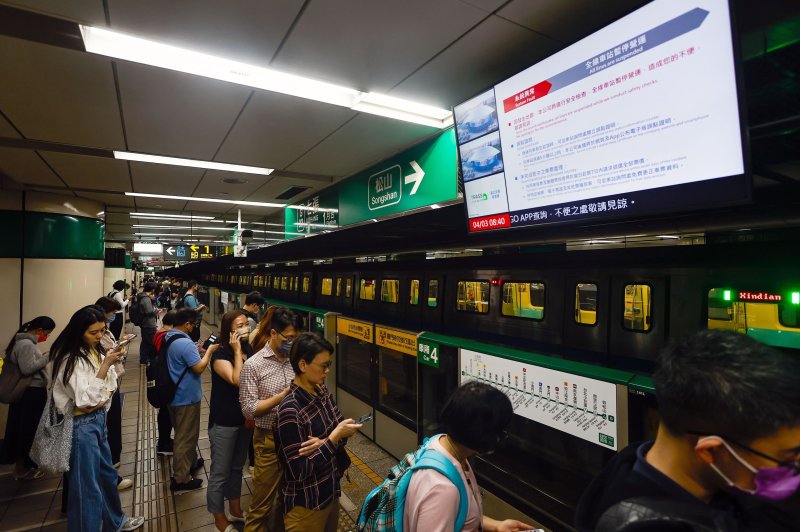1 of 3 | Passengers wait below a screen broadcasting a subway train suspension announcement following a magnitude 7.4 earthquake Wednesday morning local time near Hualien, in a subway station in Taipei, Taiwan. The quake was centered 11 miles south of Hualien City, according to the U.S. Geological Survey. Photo by Daniel Ceng/EPA-EFE
April 2 (UPI) — A powerful earthquake measuring 7.4 magnitude rocked much of Taiwan on Wednesday, according to the U.S. Geological Survey, collapsing dozens of buildings in the southern city of Hualien and forcing tsunami warnings for Taiwan, southern Japan, and the Philippines.
The quake, which struck at 7:58 a.m. local time Wednesday morning about 11 miles south of Hualien City, was quickly followed by a 6.5 magnitude aftershock, as reports of damage and injuries began to roll in.
“Today, Taiwan was struck by a magnitude 7.2 earthquake, resulting in reports of building collapses and landslides in Hualien,” Taiwan’s Red Cross wrote Wednesday in a post on X. “The Hualien Red Cross Disaster Relief Team and military units are rapidly mobilizing to minimize the impact and provide assistance to those affected.
Nine people were the first to be reported injured during the earthquake, after getting caught in a landslide on a highway in central Taiwan.
Taiwan’s Central Emergency Command Center later announced at least 26 buildings had collapsed, with reports of people trapped in seven of the fallen structures.
Fifteen of those buildings are in Hualien, which has a population of about 106,000. Photos show the buildings collapsed or tilted off their foundations. Security footage throughout the city caught the moment the quakes hit, showing structures and roadways shaking violently as people stopped in their tracks to wait it out.
Taiwan’s Central Weather Administration called it the strongest quake on the island in 25 years, as tsunami warnings were issued for Taiwan and southern Japan with waves up to 9 feet.
Flights heading to areas with tsunami warnings were diverted or suspended at Japan’s Naha Airport on Okinawa, according to Japan Airlines, before resuming after the tsunami warning was downgraded. No casualties or damage have been reported in Japan.
While the Philippines also could get hit by tsunami waves for hours, according to the Philippine Institute of Volcanology and Seismology, there are no tsunami threats to New Zealand or the U.S. Pacific coast.
Taiwanese President Tsai Ing-wen said Wednesday she has “immediately instructed the administration to get on top of the situation and understand local impacts as soon as possible,” according to a post on Facebook.
Tsai also ordered national military to “meet the needs of local governments and provide support to ensure the safety of the lives and property of citizens,” as she warned everyone on the island that trains are delayed and that due to “multiple aftershocks,” no one should “take the elevator for the time being.”
According to Taiwan’s Central Weather Administration, aftershocks — which could be as strong as magnitude 6.5 or 7.0 — are expected to hit the island for the next three or four days.

